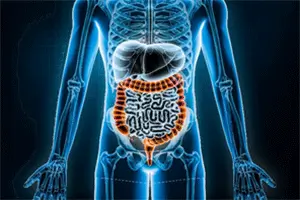
What is the Gut Microbiome?
Your “gut” roughly refers to your entire gastrointestinal tract, but when topics related to the gut are discussed, they are typically only referring to the colon (large intestine) where most of the gut microbiota are found.
The gut is colonized by trillions of diverse microorganisms, (bacteria, viruses, fungi, and parasites), that collectively form a microbial community known as the gut microbiome. Researchers use the word “microbiota” to refer to all the microbes in a community and “microbiome” to refer to their collective genes.
Using the Body’s Microbes to Treat Disease
Numerous investigations have explored the symbiotic relationship these microorganisms have with their human host, and how they play a critical role in the functioning of many of our organs. (1) Some examples include the gut-brain axis, the gut-lung axis, and the gut-skin axis. In fact, in the last decade, a growing number of medical researchers are postulating that the common denominator of many, (possibly most), of our most common chronic diseases such as diabetes, cardiovascular disease, and some cancers, is inflammation. Detecting microbial imbalances (dysbiosis) is thought to be the future of treating hundreds of diseases.
A highly successful example of the effectiveness of microbiome medicine is the use of fecal transplants for patients infected with Clostridioides difficile, more commonly called C.diff, which causes diarrhea and colitis. This process involves transferring stool from a healthy donor to the colon of an infected patient, resulting in a complete restoration of the balance of bacteria in the patient’s gut microbiome.
Possible Causes of Dysbiosis
A balanced microbiome is one where there’s a healthy diversity of microorganisms, and the absence of a single dominant single bacteria, virus, or fungus. Dysbiosis interferes with the beneficial functions of the microbiome. Possible causes may include:
antibiotics and antimicrobial agents
other drugs and medications (ex: proton pump inhibitors, metformin)
environmental toxins
chronic diseases
physical and psychological stress
smoking
excessive alcohol use
food choices
overuse of probiotic supplements
How Gut Health Influences Bone Health
A healthy gut is essential for absorbing nutrients that directly impact bone health. Calcium, magnesium, vitamin K2, and vitamin D are just a few of the critical nutrients the body needs to support bone strength. If your gut is not functioning properly, it could lead to malabsorption of these nutrients, affecting bone density over time. Research indicates that a healthy, diverse gut microbiome is linked to increased bone mass, whereas dysbiosis may be associated with lower bone mineral density and osteoporosis. (2,3,4)
Chronic low-grade inflammation is a common consequence of poor gut health. Inflammatory markers, such as cytokines, can increase the activity of osteoclasts (cells that break down bone tissue) and decrease osteoblast activity (cells responsible for building bone), leading to bone loss.
Tips for Supporting Gut Health to Benefit Your Bones
Nourish your microbiome by including prebiotics, which act as food for the beneficial bacteria in the gut. You do this by eating a fiber-rich diet. So called prebiotics are naturally abundant in many fibrous foods including various fruits, vegetables, leeks, garlic, onions, whole grains, and legumes. (5)
Consume fermented foods such as yogurt, kefir, sauerkraut, kimchi, miso, tempeh, kombucha, and some cheeses (ex: Swiss, Jarlsberg, cheddar.) These foods are rich in probiotics that promote gut health and help maintain a balanced gut microbiota.
Limit sugar and processed foods. A diet high in sugar and processed foods can contribute to dysbiosis, promoting inflammation and poor bone health. Try to focus on whole, minimally processed foods.
What About Probiotic Supplements?
If you struggle to get enough probiotics from food, probiotic supplements may be beneficial. However taking these supplements for too long can alter the body’s natural diversity and overpopulate certain strains. (6) Additionally, as with all supplements, the marketplace is largely unregulated, so always look for quality control seals, such as USP. It is always best to get what we need from our diet such as the examples listed above.
Key Takeaways
The human gut microbiota may be a key mediator of osteoporosis and osteogenesis. The gut-bone relationship is complex, but a growing body of research suggests that prioritizing your gut health may be the missing link to not only acquiring stronger bones, but also to improving your overall health.
As stated by Hsu and colleagues, “Prebiotics or probiotics may represent a future therapeutic avenue for ameliorating the risk of post-menopausal bone loss”.
- Gebrayel P, et al. Microbiota Medicine: Towards Clinical Revolution. Journal of Translational Medicine 2022;20(1):111.
- Ye Tu, et al. The Microbiota-Gut-Bone Axis and Bone Health. Journal of Leukocyte Biology 2021; 110 (3):525 -537.
- Jones RM, et al. Osteomicrobiology: The Influence of Gut Microbiota on Bone in Health and Disease. Bone 2018; 115:59-67.
- Hsu, E, et al. From Osteoimmunology to Osteomicrobiology: How the Microbiota and the Immune System Regulate Bone. Calcified Tissue International 2018 May; 102(5): 512-521.
- Bolte LA, et al. Long-term Dietary Patterns Are Associated with Pro-inflammatory and Anti-inflammatory Features of the Gut Microbiome. Gut. 2021;70(7):1287-1298.
- Merenstein D, et al. Emerging Issues in Probiotic Safety: 2023 Perspectives. Gut Microbes 2023;15(1):2185034.

